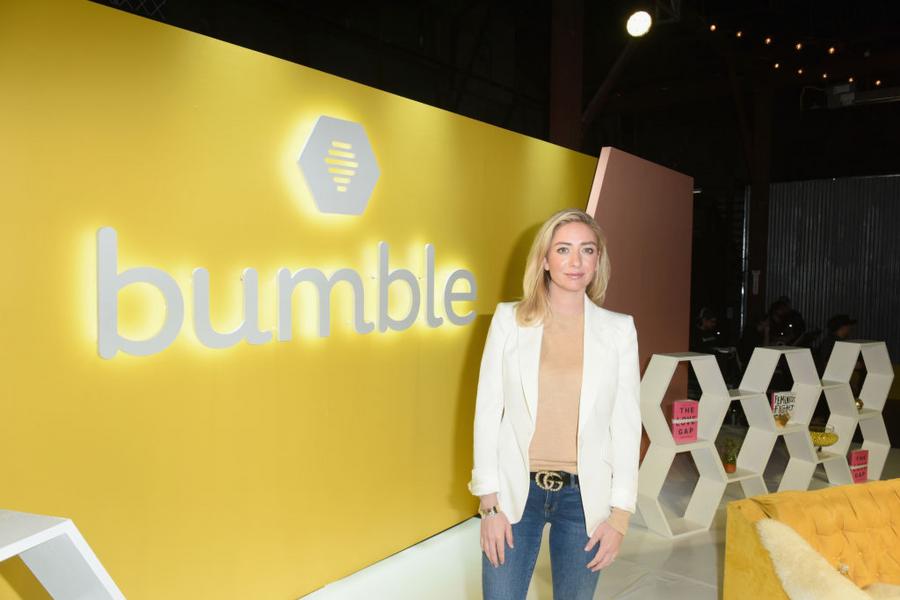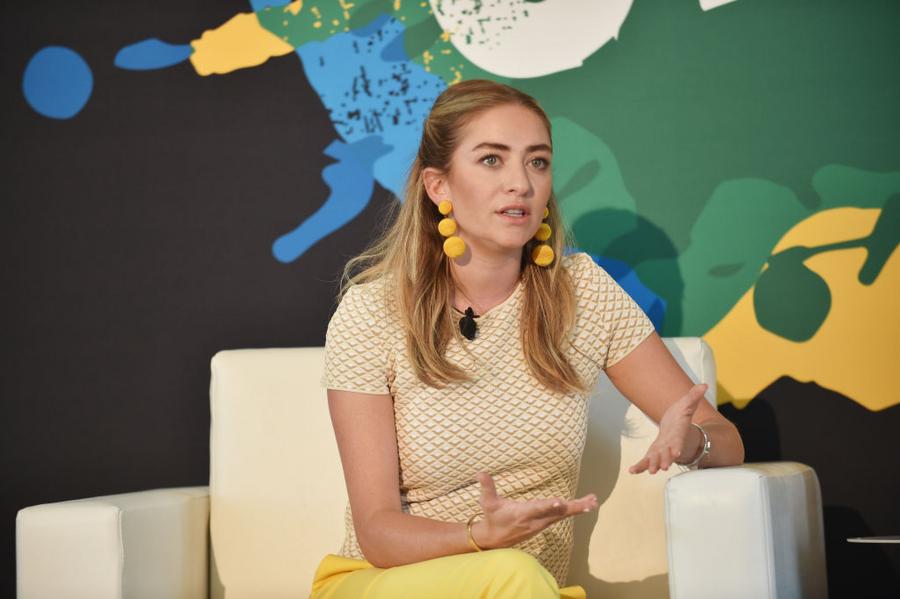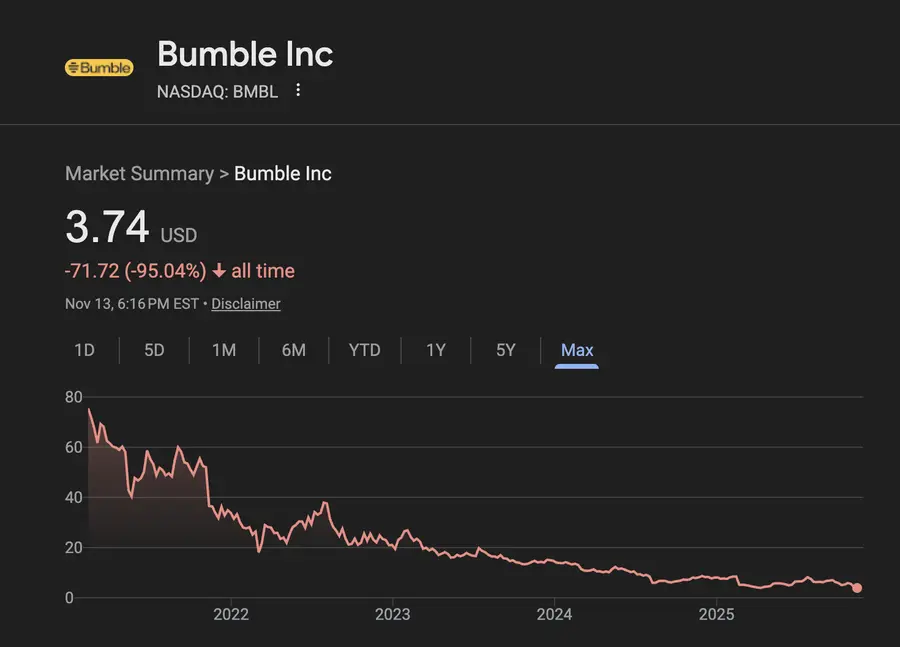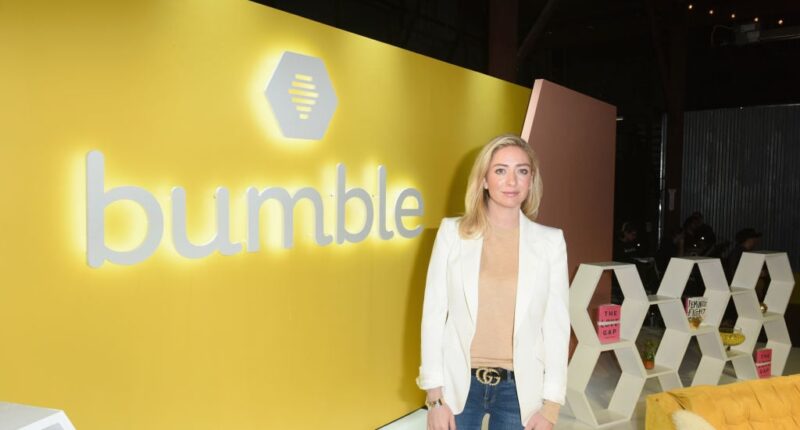The dating app game is brutal. You swipe left, swipe right, repeat until your thumb goes numb. You trade endless small-talk messages trying to prove you’re sane, interesting, and worth meeting in person. If you’re lucky, you find someone great and get to ride the euphoric high of a new relationship. If you’re not, things fizzle, implode, or end in a spectacularly painful breakup.
As it turns out, being a publicly traded dating-app company isn’t all that different.
Not that long ago, Bumble was one of the hottest and most exciting pre-IPO companies on the planet. The female-first platform was founded in 2014 by former Tinder executive Whitney Wolfe Herd. Whitney had famously been pushed out of Tinder. Sexual harassment allegations were filed. Tinder executives tried to erase her as a co-founder. And with a relatively small settlement in hand, Whitney struck out on her own and launched a new, better, cooler, female-empowerment-driven dating app. In the process, she made Tinder look like the old, busted platform no one wanted to be on.
In February 2021, Bumble soared in its IPO debut, minting Whitney as the youngest self-made female billionaire in the world. And then… just like a great relationship gone sideways… Bumble stumbled.

Vivien Killilea/Getty Images
The Rise
Bumble didn’t just arrive — it detonated onto the scene. From day one, Whitney Wolfe Herd positioned the app as the antithesis of Tinder: a place where women controlled the conversation, where toxic behavior wasn’t tolerated, and where dating didn’t feel like a digital bar fight. The pitch was simple and brilliant. In heterosexual matches, only women could send the first message. In same-sex matches, either person could initiate. It was a small product tweak that solved a massive emotional pain point, and it immediately set Bumble apart in a landscape dominated by Tinder, Hinge, and a thousand forgettable clones.
By late 2015, Bumble had logged 80 million matches and was spreading across college campuses, office parks, and major cities with wildfire speed. What most users didn’t realize was that the app wasn’t an independent startup at all — it was technically a subsidiary of Russian mogul Andrey Andreev’s dating empire. Wolfe Herd owned roughly 20% of the business in its early structure, Andreev owned about 80%, and Bumble was powered by Badoo’s engineering infrastructure in London. The unusual corporate arrangement meant Whitney didn’t actually control her own company in the early years, but it also meant she had access to capital, engineering talent, and user-acquisition firepower that most founders could only dream of.
The growth was staggering. By 2017, Bumble had over 22 million users. By 2019, the number had passed 100 million. That same year, Blackstone acquired Andreev’s stake in a deal valuing Bumble’s parent company at $3 billion. The deal removed Andreev, reorganized the board, installed Wolfe Herd as CEO, and gave her a life-changing liquidity event: a $125 million payout, plus a loan to her holding company that she later repaid. For the first time, Whitney truly controlled Bumble.
With a clean cap table, a new governance structure, explosive user growth, and a brand that dominated the cultural conversation, Bumble made its move. In early 2021, Whitney took the company public. Bumble priced its IPO at $43 per share, opened at $76, and briefly flirted with $84. The market cap surged to roughly $8–9 billion, instantly minting Wolfe Herd as the youngest self-made female billionaire in history. Investors were euphoric. Analysts were glowing. The media treated Bumble like the new gold standard for female-led tech.
For a brief, dazzling moment, Bumble was the future of online dating — a $9 billion rocket ship, fueled by cultural relevance, investor appetite, and a founder whose story was irresistible.

Bryan Bedder/Getty Images
The Fall
The trouble started almost immediately. After the euphoric IPO spike, Bumble’s stock settled into a long, grinding descent that no amount of optimistic press releases or product updates could reverse. By the end of 2021 — barely ten months after Whitney Wolfe Herd became a billionaire — the share price had fallen enough to wipe out her billionaire status. Wall Street’s early excitement about a female-first dating revolution faded fast once investors dug into the numbers: user growth was slowing, engagement had cooled, and Bumble’s expansion into friendship (BFF) and networking (Bizz) wasn’t producing meaningful revenue.
Then came 2022. And 2023. And 2024. Each year brought a new round of disappointing guidance, weaker-than-expected earnings, and intensifying competition from Tinder, Hinge, and an explosion of niche dating apps. Here’s a chart of how Bumble’s stock has performed since going public in early 2021. Note the red “all time number”:

95% Drop
Whitney Wolfe Herd was a paper billionaire for only about ten months — from February 2021 to November 2021. At the time of the IPO, she owned a little over 11% of the company, a stake worth more than $1.5 billion at its peak. Today, according to Bumble’s latest SEC filings, Whitney owns roughly 1.5% of Bumble, or about 1.7 million shares. At the current stock price, that stake is worth approximately $6 million.
However, that number doesn’t represent the full value she has realized. Wolfe Herd cashed out meaningful sums along the way.
In addition to her one-time $125 million pre-IPO windfall from the 2019–2020 Blackstone acquisition and restructuring, Whitney has sold at least $50 million worth of Bumble shares since the company went public. That includes:
- $40+ million from a 2023 secondary offering tied to Blackstone’s sell-down
- $8.5 million from her 2025 open-market sale
- Plus several smaller disposals to cover RSU tax obligations
Where Whitney and Bumble Are Today
Whitney stepped down as CEO in 2024, moved into an executive-chair role, and then returned to the CEO seat in 2025 to help steady the business. Bumble still has millions of users and strong brand recognition, but it now operates in a far more competitive, slower-growth landscape.
Whitney is far from being a billionaire. Today, we estimate her net worth at around $100 million.
She and her husband, Texas oil heir Michael Herd, have channeled some of that wealth into high-end real estate, including a 6.5-acre Lake Austin compound, which was briefly listed in 2020 for $28.5 million, and a historic Montecito estate, which they bought from Ellen DeGeneres for $21 million and sold in 2025 for $22.8 million.
At home, Wolfe Herd leads a quiet family life centered around Austin, where she and Michael are raising their young son. Whether Bumble can mount a second act — and whether Whitney can rebuild anything close to her former billionaire-level paper fortune — remains to be seen. For now, Wall Street is swiping left hard.








